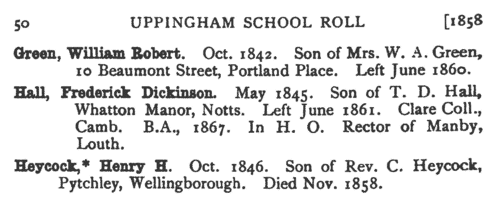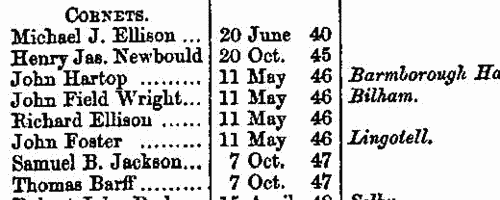Barle Surname Ancestry ResultsOur indexes 1000-1999 include entries for the spelling 'barle'. In the period you have requested, we have the following 10 records (displaying 1 to 10): Buy all | | | Get all 10 records to view, to save and print for £54.00 |
These sample scans are from the original record. You will get scans of the full pages or articles where the surname you searched for has been found. Your web browser may prevent the sample windows from opening; in this case please change your browser settings to allow pop-up windows from this site. Fine Rolls
(1369-1377)
The fine rolls of the 43rd to 51st years of the reign of king Edward III record part of the government administration in England, with orders sent out day by day to individual officers, and commitment of particular responsibilities and duties. There is also some material relating to Wales, Scotland, Ireland and the English possessions in France. BARLE. Cost: £4.00.  | Sample scan, click to enlarge

| Inhabitants of Cheshire and North Wales
(1400-1409)
The county of Cheshire had palatine status, being in some measure independent of the rest of England: moreover, from the Statute of Wales of 1284, after king Edward I's subjugation of North Wales, until the union of England and Wales in 1536 to 1543, much of the administration of North Wales (county Flint in particular) was directed from Chester. When the Chester Recognizance Rolls were moved from Chester to the Public Record Office, they were placed among the Welsh Records. These rolls, so called because they do include recognizances (of debts &c.) among their contents, are in fact the Chancery Rolls of the palatinate, containing enrolments of charters, letters patent, commissions and other documents issued under the seal of the palatinate. Deeds and other evidences of a private nature were also enrolled on them. A calendar of the Recognizance Rolls from their commencement to the end of the reign of Henry IV was prepared by Peter Turner and included in the 36th Annual Report of the Deputy Keeper of the Public Records in 1875. We have now indexed this, dividing the enrolments into decades. This is the period from the 1st to the 11th years of king Henry IV.BARLE. Cost: £6.00.  | Sample scan, click to enlarge

| Norman Rolls
(1200-1417)
The dukedom of Normandy is one of the appendages of the English crown, but actual possession of the dukedom was actively contested by the kings of France. During the periods of English power records were kept for Normandy similar to those of the royal administration in England, with enrolment of letters and grants of liberties and privileges and confirmations of previous enjoyed rights. The rolls for 1200 to 1205 and during the reassertion of English rule under Henry V in 1417, were edited by Thomas Duffus Hardy for the Commissioners of the Public Records, and published in 1835. Most of the persons mentioned are French inhabitants of Normandy or Englishmen in France, but there is also a long section (from page 122 onwards) of valuation of lands of Normans in England, where English jurors, county by English county, attest to acreage, numbers of cattle &c.BARLE. Cost: £4.00.  | Sample scan, click to enlarge

| Official Papers
(1547-1580)
The State Papers Domestic cover all manner of business relating to England, Ireland and the colonies, conducted in the office of the Secretary of State as well as other miscellaneous records.
BARLE. Cost: £4.00.  | Sample scan, click to enlarge

|  Masters and Apprentices
(1713) Masters and Apprentices
(1713)
Apprenticeship indentures and clerks' articles were subject to a 6d or 12d per pound stamp duty: the registers of the payments usually give the master's trade, address, and occupation, and the apprentice's father's name and address, as well as details of the date and length of the apprenticeship. 1 January to 31 December 1713.BARLE. Cost: £8.00.  | Sample scan, click to enlarge

|  Apprentices registered in Wells
(1762) Apprentices registered in Wells
(1762)
Apprenticeship indentures and clerks' articles were subject to a 6d or 12d per pound stamp duty: the registers of the payments usually give the master's trade, address, and occupation, and the apprentice's name, as well as details of the date and length of the apprenticeship. There are central registers for collections of the stamp duty in London, as well as returns from collectors in the provinces. These collectors generally received duty just from their own county, but sometimes from further afield. The indentures themselves can date from a year or two earlier than this return. (The sample entry shown on this scan is taken from a Bristol return. Each entry has two scans, the other being the facing page with the details of the indenture, length of service, and payment of duty.) IR 1/54BARLE. Cost: £8.00.  | Sample scan, click to enlarge

| Tradesmen of Lynn in Norfolk
(1292-1836)
Lists of admissions of freemen of Lynn from the earliest surviving records to 1836 were published by the Norfolk and Norwich Archaeological Society in 1913. These lists were extracted from the tallage rolls of 1291 to 1306; the Red Register of Lynn from 1342 to 1395; from the assembly rolls for the reigns of Henry IV and V [1399 to 1422]; from the hall books from 1423; and from a list of freemen starting in 1443 in the Book of Oaths (but itself abstracted from entries in the hall books). Freedom of the borough, necessary to practise a trade there, could be obtained by birth (in which case the father's name and occupation are usually given); by apprenticeship to a freeman (the master's name and occupation being given); by gratuity; or by purchase. Both the freemen and the masters listed are indexed here. The main abbreviations used are: B., freedom taken up by right of birth; A., freedom taken up by right of apprenticeship; G., freedom granted by order of assembly (gratuity); and P., freedom acquired by purchase.BARLE. Cost: £4.00.  | Sample scan, click to enlarge

| Creditors and solicitors in England and Wales
(1846)
Perry's Bankrupt and Insolvent Gazette, issued monthly, included lists of bankruptcies and stages in the liquidation of the estate, payment of dividends, and discharge. The initial entry in this sequence gives the name of the bankrupt (surname first, in capitals), the date gazetted, address and trade (often with the phrase dlr. and ch., meaning dealer and chapman); the dates and times and courts of the official processes of surrender; the surname of the official commissioner (Com.); the surname of the official assignee; and the names and addresses of the solicitors; the date of the fiat; and whether on the bankrupt's own petition, or at the demand of petitioning creditors, whose names, trades and addresses are given. This is the index to the names of the solicitors and petitioning creditors, from the issues from January to December 1846.BARLE. Cost: £6.00.  | Sample scan, click to enlarge

| Boys entering Uppingham School
(1850)
The public school at Uppingham in Rutland was founded by Archdeacon Johnson in 1584. A roll of scholars from 1824 to 1905 was edited by J. P. Graham, and published in 1906. This was a revision and updating of an 1894 edition of the roll, the great bulk of the work having been done by Mrs Mullins. The roll is arranged by year, and within each year by term of entrance, and then alphabetically by surname within each term. Each boy's name is given, surname first, with an asterisk where known (in 1906) to have died. Then there is month and year of birth, father's name (most often just surname and initials) and address (at entrance). Where the boy represented the school at Rugby football (XV) or cricket (XI), that is indicated. After the month and year of leaving the school, there is a brief summary of achievements in later life, and, where known, address as in 1906. BARLE. Cost: £4.00.  | Sample scan, click to enlarge

| Yeomanry and Militia Officers
(1850)
The Royal Military Calendar lists officers of the Yeomanry Cavalry and the Militia, the armed forces supporting the civil power in Britain and IrelandBARLE. Cost: £6.00.  | Sample scan, click to enlarge

|
Research your ancestry, family history, genealogy and one-name study by direct access to original records and archives indexed by surname.
|













